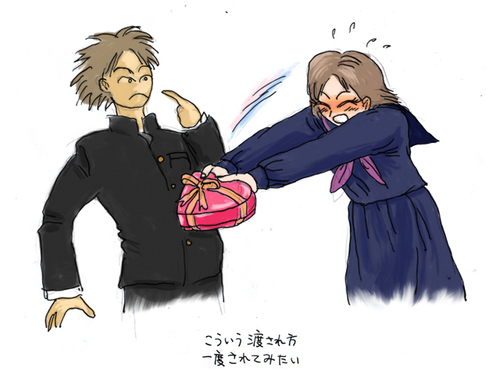Chocolate truly is the food of love. Research has found that it contains chemicals such as phenylethylamine and anandamide, which have a similar effect on the brain to marijuana and amphetamines, creating that ‘feel-good’ sensation. This might go some way to explaining the fact that chocolate is the UK’s favourite treat and why it’s so high on the menu when it comes to Valentine’s Day.
The Cadbury’s Connection
Giving chocolate on the Feast of St Valentine started in the West. Although, it stakes no claim on the tradition, it’s generally thought that the practice was ‘started’ by Cadbury’s, who started making boxes of romantically-themed chocolates in the Victorian era. Whoever’s responsible, they created a real money-spinner, with Britons spending, on average, around £95 million on Valentine’s Day, alone.
Although it started in the West, as with all the best traditions, it travelled further afield – making it all the way to Japan. However, over time, the mechanics of the practice changed – making it virtually unrecognisable to us chocolate-guzzling Westerners.
Japan discovers St Valentine’s Day
In the UK – and most of the West – the onus tends to fall on the male’s shoulders; the woman is the focus of any romantic gestures and attentions. In Japan, this is completely reversed; it’s all about the guys getting spoiled – but it’s not all about love; in some cases it’s about courtesy and even social obligation.
Let’s backtrack a bit: chocolate-gifting was introduced to the Japanese on February 14th 1936, by the Kobe-based confectioners, Morozoff Ltd. Targeting foreigners, it ran an advert in an English newspaper, promoting their products. By 1953, it was trumpeting the tradition to the Japanese, swiftly followed by other chocolate-manufacturers – and the custom really kicked-off. However, over the next 20 years, the meaning behind St Valentine’s Day changed and it became an opportunity for women to express the different natures of their personal relationships, without having to say anything. Cannily, the manufacturers developed different chocolates for different sentiments, leading to a sliding scale of gifts:
Gifts for Lovers…and brothers…and bosses…and others…
Hommei-choco: this is the real deal. Hommei-choco gifts are bought for husbands, lovers or partners. Translated, it means ‘true-feeling chocolate’ and, if the gift is home-made, is considered to be a display of true love.
Next on the list is tomo-choco, or ‘friend chocolate’. This is traditionally given by a woman to her female friends, to show just how much they value their friendship. However, male friends can be included, as long as there’s no romantic interest involved.
Giri-choco, which translates as ‘obligation chocolate’, is given to menfolk who it would be disrespectful to ignore. We’re talking people such as brothers, fathers, uncles, work colleagues and bosses. It’s a bit like when you buy your child’s teacher a Christmas present.
‘Ultra-obligatory chocolate’, or Cho-giri choco is the bottom end of the scale. These chocolates are given to people the woman isn’t necessarily particularly fond of but encounters them enough that if they didn’t receive something it might put their noses out of joint.
In Japan, the pressure is on the women; men don’t – and aren’t expected to – do a thing. However, the tables turn a month later on March 14th, which is ‘White Day’ – the day on which those chocolate-chugging chaps have to return the favour with gifts that are at least twice as expensive as the ones they received…
You can check out more about Japanese cuisine, here on the main site: http://www.roundtheworldcooking.com/japan/







2 Responses to "Why you won’t be getting chocolate on St Valentine’s day – if you’re a Japanese woman"